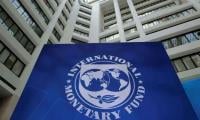ISLAMABAD: US credit rating agency Moody’s Investors Service on Wednesday assigned B3 rating to dollar-denominated senior unsecured notes and sukuk issued by the government last month to raise $2.5 billion, saying continued reforms would help tap robust growth potential.
“Pakistan’s B3 issuer rating reflects a credit profile that balances robust growth potential and a relatively large economy, against low income levels, infrastructure constraints and very low global competitiveness,” Moody’s said in a statement.
But, the agency said an improved track record of reforms started under an International Monetary Fund program, and a stronger outlook for infrastructure investment driven by the China-Pakistan Economic Corridor (CPEC) project supported the credit in recent years.
Last month, Pakistan raised $1.5 billion via 10-year notes at 6.875 percent and $1 billion through 5-year sukuk at 5.625 percent to arrest the decline of foreign reserves. Standard and Poor’s assigned preliminary ‘B’ long-term rating to Eurobond and sukuk ahead of their issuance.
Moody’s warned that the government’s high debt burden, very narrow revenue base, fragile external payments position and high political risk constrain the credit profile. “Pakistan’s economy demonstrates relatively robust GDP growth, limited by supply-side constraints on the economy,” it said. “While the scale of the economy is relatively large, Pakistan’s per capita income is very low, indicating limited capacity to absorb negative shocks.”
The agency said continued government commitment to implementation of reforms would help reinforce fiscal and monetary policy discipline, “thereby preserving recent macroeconomic stability gains and strengthening institutional effectiveness in the future.”
“Such improvements would help support the sovereign credit profile through enhanced policy credibility and effectiveness,” it added. Moody’s assesses Pakistan’s external vulnerability risk as low, reflecting a relatively modest current account deficit, half of which is financed by stable foreign direct investment.
“Moreover, foreign exchange reserves cover external debt payments due over the next year,” it said. “However, external pressures are now building as a result of the recent widening of the current account deficit driven by increased capital goods imports for CPEC, financed in part by external debt, and the slowdown in remittance inflows.” The agency said the government is lengthening the maturity of debt, which will reduce gross financing needs.
“Government debt rollover risk is also mitigated by sizeable recourse to domestic bank borrowing and, to some degree, by a debt structure that consists of long-tenor credits from multilateral and official bilateral creditors,” it added.
Moody’s said discontinuation in reforms program and political instability would pose risks to the country’s credit profile. “We would view a stalling of the government’s post-IMF program reform agenda, including revenue reforms and the strengthening of monetary policy and central bank independence, to be credit negative,” it added. “Continued material widening of the fiscal deficit, ongoing weakening of the external payments position, loss of multilateral/bilateral financial support, or significant escalation in political tensions would also weigh on Pakistan’s credit profile.” The credit rating agency said CPEC is likely to reduce infrastructure gap, but it would also increase the country’s debt burden.
“There is potential for further strengthening in growth beyond our current expectations, as successful implementation of the CPEC project may transform the Pakistani economy by removing infrastructure bottlenecks and stimulating both foreign and domestic investment,” it added. “… the fiscal costs related to the project and, more generally, development spending could raise Pakistan's debt burden more rapidly and significantly than we expect. In addition, recent indications of renewed increases in external pressure could develop into greater external vulnerability.”
Moody’s said upward triggers to the country’s rating would stem from sustained progress in structural reforms that would significantly reduce infrastructure impediments and supply-side bottlenecks. “This would improve Pakistan’s investment environment and eventually aid a shift to a sustained higher growth trajectory.”
In this picture, the PCJCCI logo can be seen on September 1, 2022. — Facebook/Pakistan China Joint Chamber of...
The logos of the World Bank and IMF. — AFP FileNEW YORK: The United States is the MVP of GDP. That was the...
A security guard sits in front of a wall with signs and slogans at the operation building at the Pakistan Steel Mills ...
A worker cleans the entrance to the headquarters of Bank Indonesia, the nation's central bank, in Jakarta, Indonesia....
The MCB's logo is seen on a wall outside the bank's head office. — MCB websiteKARACHI: MCB Bank Limited on...
Stack of Rs5,000 and Rs1,000 notes. — AFP/FileKARACHI: The rupee lost ground against the dollar in both currency...







